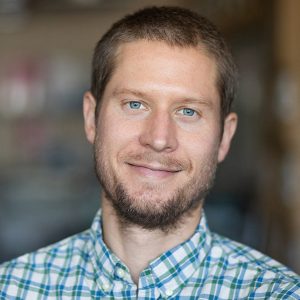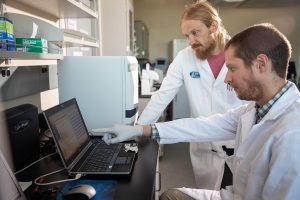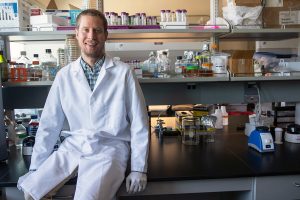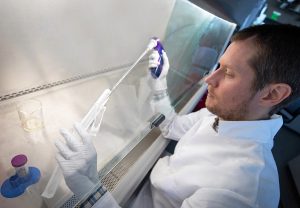Fairness First blog
Researchers voices in health equity
The Fairness First blog represents a space where researchers share with the broader community why health equity research matters to them, how do they connect to health equity, and what is the value of community engagement in the research process.
June 10, 2022
Health equity and infectious diseases with Jason Ladner
Associate Professor, Department of Biological Sciences

Jason Ladner is an assistant professor in the Department of Biological Sciences and the Pathogen and Microbiome Institute at Northern Arizona University. Dr. Ladner’s research uses technologies in biology to study infectious diseases. Dr. Ladner has recently helped to develop a new approach for understanding which viruses a person (or animal) has been infected with and how their immune systems responded to those infections.
Q. How would you describe your research and why it matters?
A. One focus of my research is the use genome sequences* from viruses, bacteria, and fungi to understand the emergence, or new appearance, and spread of infectious diseases. This is possible because as an organism’s genome is copied, errors or mutations occur and pile up at a regular rate through time.
Therefore, these mutations can be used to estimate the timing of important events, such as when an emerging virus (like SARS coronavirus 2 which causes COVID-19 or Ebola virus) was first spread from animals to humans.
A second focus is understanding the immune system’s response to infection. In particular, my research focuses on antibodies, which form part of our memory immune response and help to protect us against future infections. Using new technologies in biology, we can explore the antibody response in ways that were not possible before. Therefore, we can better understand how the immune system responds to both natural infections and vaccines.
*A genome includes all the genetic information (i.e., DNA) needed for an organism – such as a human, a plant, or a virus – to be created and to function. A genome sequence is the specific order of DNA pieces in a genome, and DNA sequencing is the process of finding that order.
Q. Tell us about a moment in your life when you decided, “This is the type of research I want to do!”
A. During graduate school, I met with a professor to discuss issues I was having with my research project. I was studying reef-building corals at the time, and after listening to me describe my project, I remember him saying, “Well, you’re trying to do genomics without a genome!”
At the time, DNA sequencing was not as cheap and easy as it is now, and genomes had only been sequenced for a small number of “model” organisms, like fruit flies and mice. However, in a larger sense, what he was saying is that certain questions can only be answered with the right tools. This stuck with me, and I think is part of the reason I have been drawn to the development and use of new technologies.
Q. What is the element of ‘unfairness’ or ‘inequity’ in the issue you are examining (in the broad context of health and wellbeing)?
A. Globally, about 20% of all deaths are caused by infectious diseases, and infections have also been linked to the onset of many chronic diseases. For example, infection with Epstein-Barr virus, best known for causing mononucleosis or ‘mono,’ is a risk factor for developing multiple sclerosis. And while infectious diseases affect everyone to some degree, important health disparities or differences exist in the impact of infectious diseases.
These disparities are the result of complex, and often not well understood, interactions of many factors and social biases – including for example differences in socioeconomic status (i.e., individual education, income, and work opportunities) and access to health care, as well as racism and homophobia.
 Q. Based on your previous answer, how do you see your work helping to push the needle on this issue toward “fairness” or “equity”?
Q. Based on your previous answer, how do you see your work helping to push the needle on this issue toward “fairness” or “equity”?
A. A critical step in addressing these differences in disease impact is understanding existing disparities, which are disease-specific and can vary in space and time. Infections are commonly found by looking for pathogen*-specific nucleic acids (i.e., molecules like DNA that carry genetic information). However, nucleic acids are only present during active infections and often only within certain body tissues or fluids.
In contrast, antibodies provide long-lived signatures of past infections, which can be found in the blood, regardless of the tissues that were originally infected. However, means for finding antibodies have been limited to testing for a single pathogen at a time. We have been developing an approach that lets us measure antibodies against 100s of pathogens in a single test. This technology allows for a much broader view of health disparities linked to infectious disease.
*A pathogen is a microorganism, such as bacteria, virus, or fungus, that causes disease.
Q. How do you want your research to make a difference or change in this world?
A. Over the short-term, I hope that my research will help us to reduce the impact of infectious diseases by better understanding how these diseases spread within populations and which groups are most heavily impacted.
Over the long-term, it’s important to remember that most discoveries are small ones and scientific progress often happens little by little. I hope that my work helps to inspire other studies in the future and therefore contributes to our growing understanding of the biological world.
Q. Is there a global context you can apply to your research? How is your research connected to situations/advancements happening on a global scale?
A. Absolutely. Infectious diseases do not respect political boundaries, and our society is more interconnected than ever. Therefore, infectious diseases can spread very quickly globally.
SARS coronavirus 2 is a perfect example. This is a virus that likely emerged in China but has now had a massive impact on every corner of the globe. Likewise, we’ve repeatedly seen variants of concern first appear in other countries, but then quickly spread to the USA and often result in local cases rising. Travel restrictions have done little to stop the spread of these viruses. Therefore, to protect Americans from COVID-19 and other infectious diseases, we also need to fight these diseases in other countries.
You can connect with Dr. Ladner at Jason.Ladner@nau.edu.
Back to the main Fairness First Campaign page.

